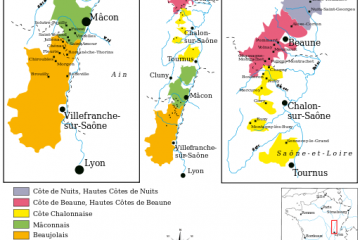Bordeaux is arguably the centre of the wine world. It spans the entire range of the market, from inexpensive to virtually priceless. Every good wine list in the world has a Bordeaux section, and “Bordeaux” itself is perhaps the most recognisable wine brand there is.
Understanding Bordeaux
Bordeaux seemingly has it all. But if there’s one thing it sorely misses, it’s simplicity. Try as they may, the Bordelais do not make it easy to understand exactly what’s going on: With 120,000 hectares of vineyards, close to 60 distinct appellations and anywhere up to 10,000 individual producers, there is a lot to get your head around.
That’s before you get into official classifications: There are six different classifications or ranking systems covering the region, with the oldest dating back to the year 1855. Each has its own set of governing criteria, some are set in stone and others are updated periodically. These classifications cover all the finest and most expensive wines of Bordeaux, except for the most expensive Bordeaux wines, from Pomerol, which is not classified. Naturally. Still with us?
Which is not to mention the en primeur system of selling wine as futures, the Place de Bordeaux, and intricate network of middlemen and women known as courtiers, négociants and agents that no outsider (and very few insiders) will ever truly understand! We could go on, but we’ll leave it there. Hopefully you get the point: Bordeaux is a complex beast, perhaps unnecessarily so, and can be difficult to get a handle on.
Learning about Bordeaux
So, then, how can you learn about Bordeaux?
- Reading, for sure. As a longtime favourite of the world’s top wine critics, there is no shortage of published books on Bordeaux, either as a whole or its component parts.
- Formal education and training, in Bordeaux and throughout the world, will endeavour to teach you all about what is, to be fair, a wonderful wine region.
- Perhaps the most effective way of learning about Bordeaux is actually going there. In terms of hands-on education, there is nothing quite like traversing the treacherous D2 road from the city into the Médoc, passing one glorious château after another, or wandering the cobbled streets of Saint Emilion and tasting the local wines.
One problem with all of the above is that they’ll cost you time and money, which may not be an option. There is one other way that you can learn a surprising amount about Bordeaux wine, very quickly, and it won’t cost you a cent – Twitter!
How Twitter can teach you about Bordeaux wine
It’s not quite like walking the vineyards yourself or participating in a vertical tasting of Château Latour, but you’d be surprised just how much Twitter can teach you about Bordeaux.
- Follow the right people. There is a whole community of active and influential wine professionals that Tweet about Bordeaux. Try Decanter’s Bordeaux correspondent Jane Anson for starters, and build up a bank of reputable, reliable people to follow from there.
- Organisational accounts can be very informative too, such as the official Bordeaux Wines account.
- Follow producers. The information you can get from individual châteaux is fascinating, and can give a real insight behind the scenes, including harvest, winemaking and blending. Some châteaux are (considerably) more advanced than others, with some good starting points including Château Bauduc and Château Palmer. The bigger name châteaux are not necessarily the best here, and often it will be lesser known estates that share the most interesting information.
- Make a Twitter list. Choose your favourites from the above and make a Twitter list to house them all in one place. That way, you can have your own personal feed of news and information about Bordeaux wine in one easily accessible place.
- Join the conversation. Don’t be afraid to join in. Have a question about the 2016 vintage in Bordeaux? Who better to ask than a producer or winemaker from the region who has lived through it? Look out also for trending hashtags and use them to find interesting and educational conversations.
Do you know of any other ways to learn about wine through Twitter or other unconventional means?
[cta_generico id=2584]


